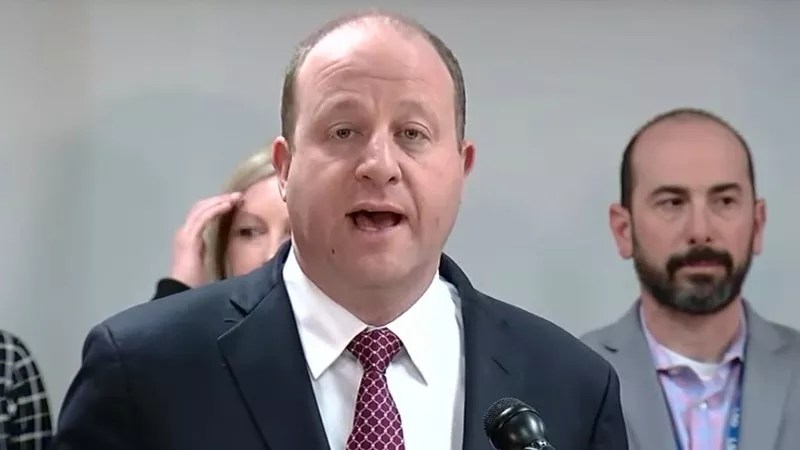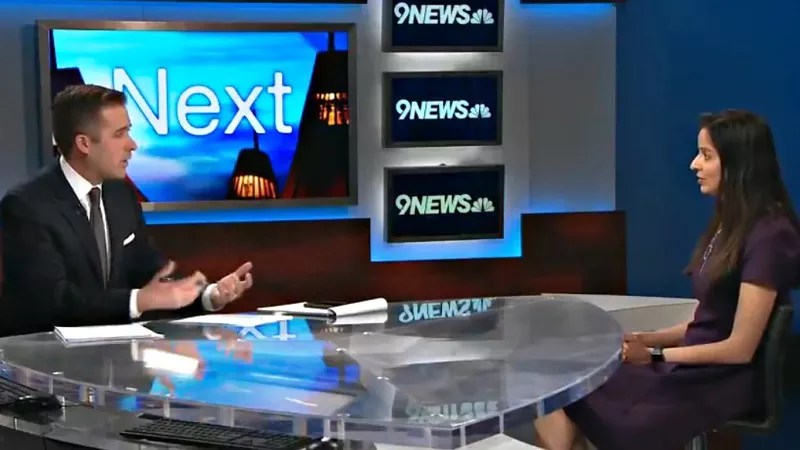
Denver7 via YouTube

Audio By Carbonatix
To the surprise of absolutely no one, Colorado now has its first presumptive cases of COVID-19, an infectious disease caused by a newly discovered type of coronavirus officially known as SARS-CoV-2. Governor Jared Polis’s announcement, shared during a press conference at around 5 p.m. on March 5, begins a new stage of reporting about the condition and potential impact on the public at large – one that places a tremendous amount of responsibility on the media to present facts without inducing blind panic.
Thus far, most news organizations are striking that balance regarding the latest developments, spelled out in information from the Colorado Department of Public Health and Environment updated at 8:32 p.m. last night (see it below). But there are exceptions.
Nationally, coronavirus coverage has been complicated by the way the administration of President Donald Trump is dealing with the spread of the malady. Rather than deferring to health officials with actual training in the field, Trump continues to offer enormously uninformed observations, and while his veep, Mike Pence, the public face of the federal response, has avoided errors of this magnitude, he won’t be confused with Bill Nye, the science guy. The result is widespread confusion about whether COVID-19 is a mere annoyance for anyone under the age of eighty or a reckoning of biblical proportions fated to reap the whirlwind.
As arguably the biggest nerd to ever serve as Colorado’s governor, Polis is preternaturally attuned to complex subjects such as this, and during his announcement, he struck a tone that found a sweet spot between concern and confidence. But as smart as he is, he’s not an epidemiologist, and when asked if there was any risk for passengers on the flight taken by the first patient who registered a presumptive positive for COVID-19, a man who skied at Keystone and Vail in recent days, he shrugged off this possibility, noting that the man was asymptomatic at the time.
On 9News following Polis’s remarks, Dr. Payal Kohli, the station’s medical expert, gently pushed back on this assertion during a conversation with anchor Kyle Clark, contending that while the prospect of fellow passengers catching COVID-19 from the asymptomatic man was likely lower than if he’d been vigorously coughing and sneezing, it was hardly at zero. CDPHE tried to massage this misstep in its update, noting that according to the Centers for Disease Control, “transmission from asymptomatic people is not thought to be the main way the virus spreads” – a phrase that stops well short of saying that others seated near the man don’t need to worry about a thing.
Was Kohli’s take appropriate? Absolutely. The media shouldn’t be afraid to contradict officials when they stray from the facts on this subject or any other. Clearly, some people are going to be freaked out no matter how this material is presented. But arming them with accurate details is a public service, especially when the corrections are made calmly, as Kohli’s were.
In our survey of the early reporting, most news agencies have used a neutral style that eschewed hyperbole. But that hasn’t always been the case on social media platforms. These days, many, if not most, of us learn about stories from news alerts or posts on Facebook or Twitter, and poor messaging in these arenas can color reactions to even the most professional reporting.
A prime example was this 9News tweet at 4:45 a.m. today: “Amazon warns of some delivery delays as coronavirus fears grip nation.” That sort of language may inspire clicks, but it doesn’t do anything to fuel the greater good. And then there was this tweet from 9News’s Marc Sallinger, sent out at 10:40 p.m. on March 5: “I first asked where the condo the man stayed in was. The answer was ‘still trying to recreate timeline…this level of detail we are still researching.’ Later, after being pressed by @MattRenoux, they said it was Keystone. Why didn’t they say that the first time?” This question is valid, but trying to create a “gotcha” moment suggests a lack of focus on the situation’s gravity.

9News’s Kyle Clark discussing COVID-19 with Dr. Payal Kohli following Polis’s press conference.
Of course, news stations shouldn’t be required to stick to relaying only reassuring data, which is why CBS4 has no apologies to make for a package titled “Most Stores Sold Out of Hand Sanitizer, Rubbing Alcohol In Denver Metro Area.” Simply put, COVID-19 is scary whether you’re in a high-risk group or not. But the press shouldn’t play on this agitation in search of either clicks or eyeballs.
Here’s the CDPHE update:
[On March 5], Gov. Polis and state health officials announced Colorado’s first presumptive positive case of COVID-19, as well as a subsequent second case. Below, find the most recent information on both cases. Updates will also be made available as needed, or on a daily basis, on the Department of Public Health and Environment’s website.
Latest information on Colorado’s first case of COVID-19:
• Colorado has its first case of COVID-19. The case is considered a “presumptive positive” because testing was conducted at the state level. The case will be sent to the CDC for official confirmation.
• The state is acting on all “presumptive positive” cases as if they were confirmed because a quick response is essential to minimize the spread of the virus.
• The patient is an out-of-state visitor to Summit County, a male in his 30s.
• The patient traveled to Italy in mid-February. An individual who traveled with him on that trip is a known case of positive COVID-19 in another state. Upon returning from Italy, the patient spent time in his home state.
• He then traveled to Colorado on Feb. 29 via plane. He was asymptomatic when he traveled to Colorado. According to CDC, transmission from asymptomatic people is not thought to be the main way the virus spreads.
• The Governor’s Office has been in touch with Denver International Airport (DIA) and has shared the information that we have at this time.
• The person traveled to Summit County from DIA in a rental vehicle and met with friends. They stayed in a condo in Summit County.
• We know that he was there for outdoor recreation and that he skied at Keystone and Vail Mountain Resort.
• The Governor’s Office notified Vail Resorts late this afternoon which oversees both ski resorts the patient visited.
• On March 3, the man developed symptoms and went to St. Anthony’s Summit Medical Center in Frisco the following day.
• On March 4, in the afternoon, a specimen was taken to the lab for testing.
• Today, on March 5, the state lab received a presumptive positive result.
• For health care reasons, the patient had to be transported to lower altitudes. The patient was discharged and traveled in a private vehicle to Jefferson County wearing a mask.
• At this time, the patient is now recovering in isolation in Jefferson County.
• His close contacts in Colorado have received quarantine instructions, and a quarantine order is forthcoming.
• Public health practitioners are investigating and will attempt to notify anyone else who may have been exposed because of this case, if necessary.
Latest information on Colorado’s second case of COVID-19: We are gathering information on this case, alongside the local public health agency. Tri-County Health Department will provide greater details as appropriate and available. Tri-County Health Department is leading this case investigation and will send a press release shortly with the most up-to-date information on the case. This case is also a “presumptive positive” because testing was conducted at the state level. CDC will confirm the test results.
• The case is an elderly female Douglas county resident.
• She returned to Colorado from international travel.
• She is currently isolated at her home per CDC guidelines.
The department continues to work closely with CDC and public health agencies across the state and is committed to protecting the health and safety of Coloradans. Health officials advise Coloradans to stay informed, take simple disease prevention measures, and prepare.
• Practice good hygiene. Thoroughly wash your hands with soap and water. In the absence of soap and water, use hand sanitizer; use a tissue or your elbow or sleeve to cover coughs and sneezes.
• Stay home if you’re sick; keep your children home if they are sick. Talk to your employer about working from home if necessary.
• We advise Coloradans to always be prepared for an emergency and have a plan for your family. Coloradans can visit the CDC’s website for more information on how to create a plan.
• Stay informed with reliable, up-to-date information. People who have general questions about coronavirus disease 2019 can call CO HELP at 303-389-1687 or 1-877-462-2911 or email COHELP@RMPDC.org, for answers in English and Spanish (Español), Mandarin and more. Coloradans can also visit the CDC and CDPHE websites for more information on best practices.
The state will provide timely updates on any additional cases that test positive at the state lab.